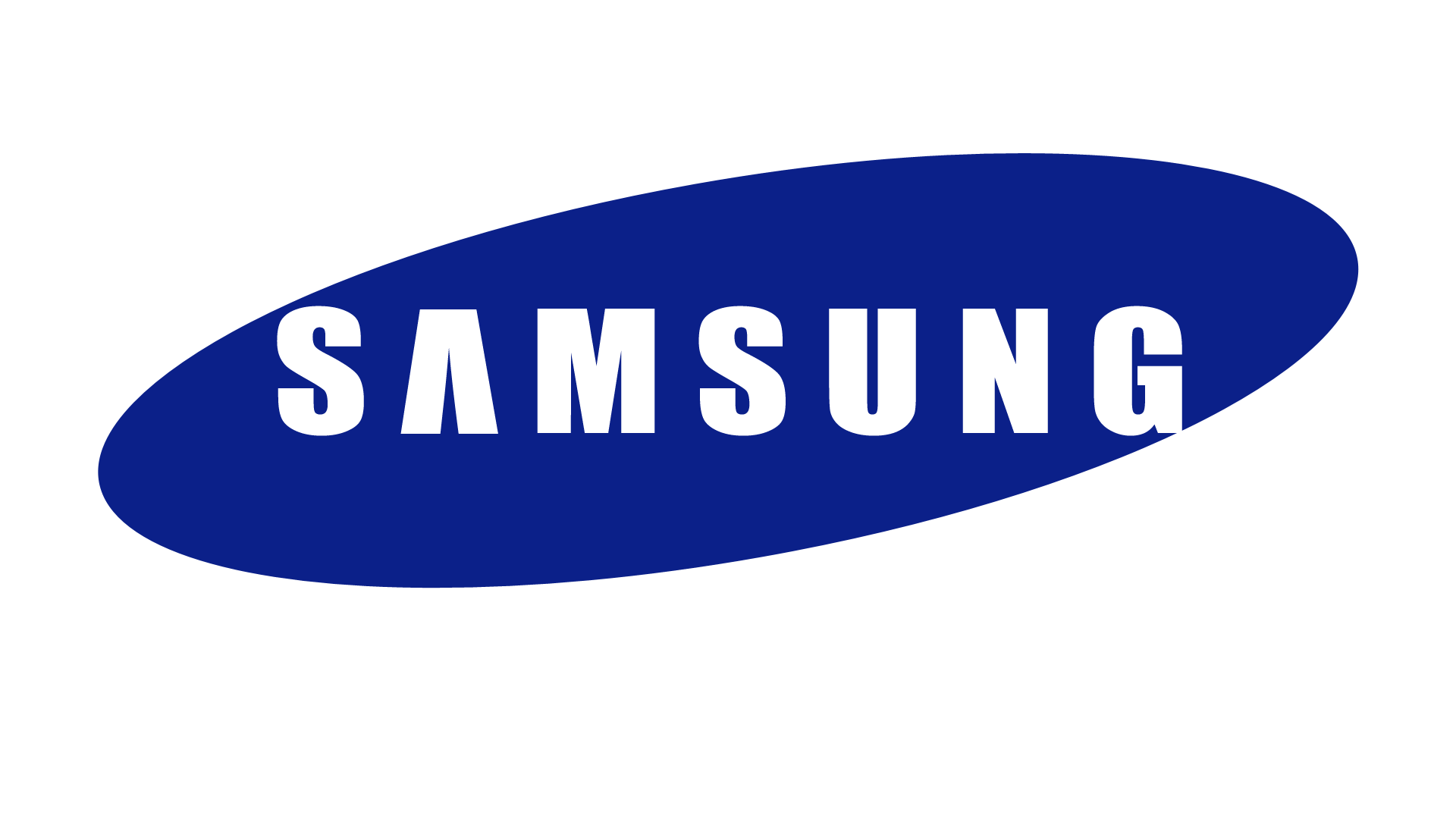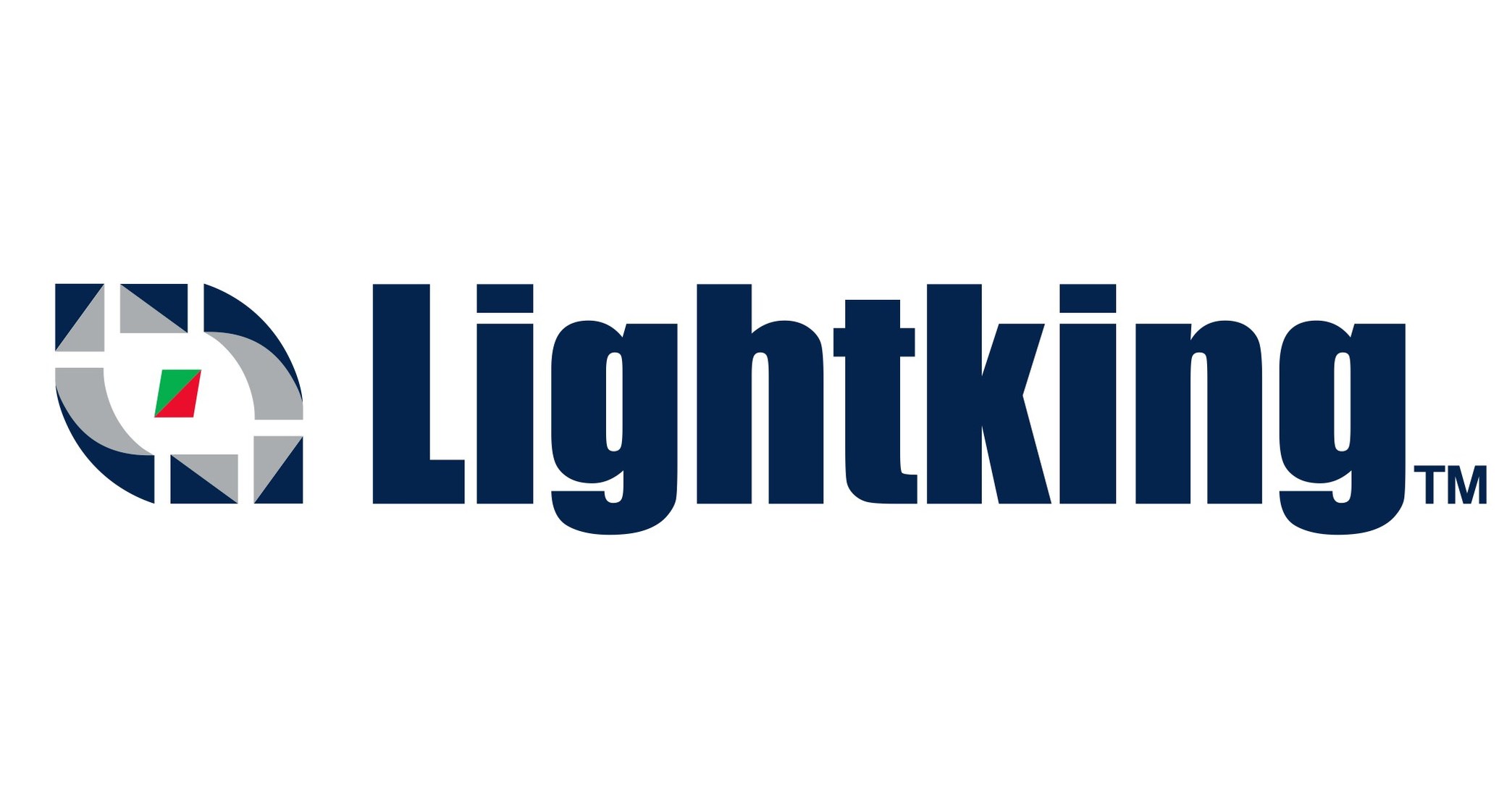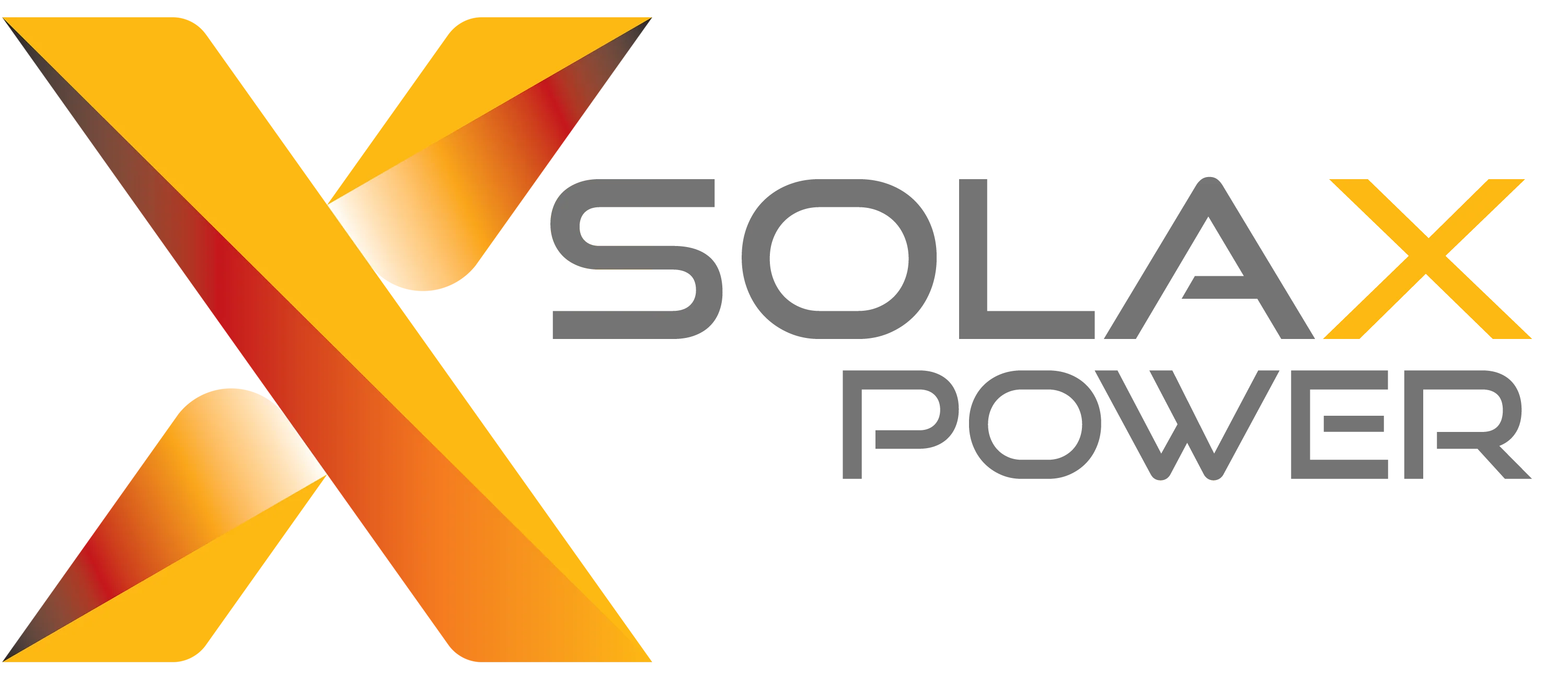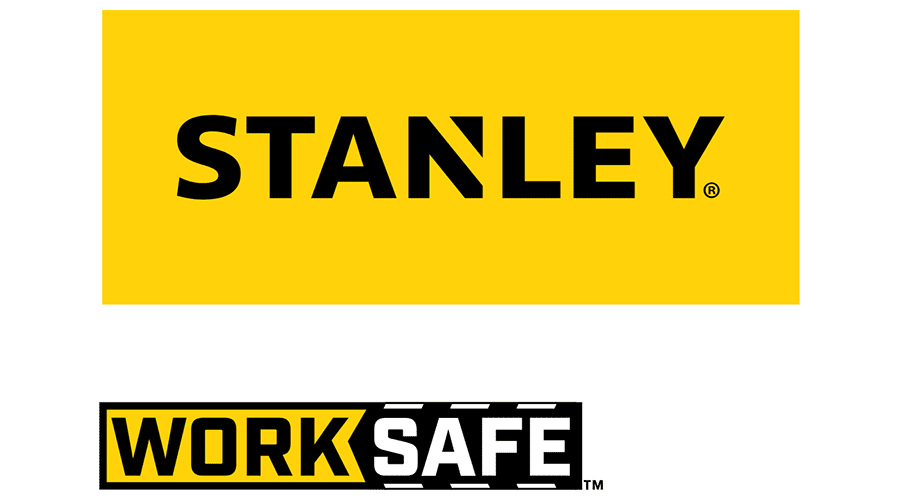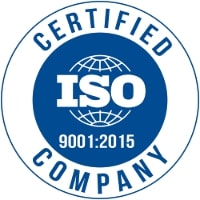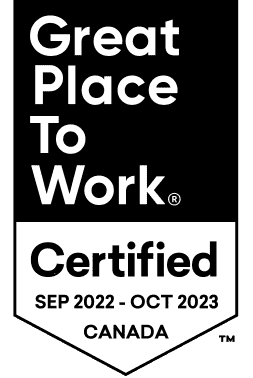BIS Scheme X Certification for Machines for Public Works, Building, and Other Mechanical Appliances

As India propels forward on the path
of rapid infrastructure development and industrial modernization, the
significance of reliable, high-performing machinery has become more vital than
ever. From public works to specialized industrial applications, machinery and
mechanical appliances serve as the backbone of engineering, manufacturing, and
construction. Ensuring their safety, quality, and conformity is not just an
operational necessity—it is a legal requirement under the Bureau of Indian Standards
(BIS) Scheme X Certification.
Let’s understand everything you need to know about the BIS certification for machines for public works & building, and mechanical appliances, especially those having individual functions not specified or included elsewhere in Chapter 84 of the Customs Tariff Act. It covers the purpose of certification, compliance requirements under Scheme X, and why manufacturers—both domestic and foreign—must act before the 28th August 2025 deadline.
What is BIS
Scheme X Certification?
Scheme X Certification, introduced by
the Bureau of Indian Standards (BIS) on 16th March 2022, is a dedicated
conformity assessment mechanism. It forms an integral part of the BIS
Conformity Assessment Regulations, 2018, and is tailored for machinery and electrical
equipment across a range of applications.
The scheme ensures:
Omnibus
Technical Regulation Order, 2024: A Regulatory Mandate
To streamline and enforce mandatory
standards across industrial machinery categories, the Ministry of Heavy Industries issued the Omnibus Technical Regulation Order (OTR), 2024. This order makes it
compulsory for all types of machines for public works, building operations, and
other mechanical appliances, including those not explicitly covered in other
subcategories of Chapter 84, to undergo BIS certification under Scheme X.
Categories
Covered Under the Certification
The certification applies to:
This wide net ensures every functional piece, whether standalone or part of a larger unit, is certified for quality and safety.
Importance of
BIS Certification for Machines for Public Works & Building, and Mechanical
Appliances
- Safety Assurance:Machines involved in public infrastructure and building operations are often used in high-risk environments. Certification ensures they are equipped with appropriate safety mechanisms and controls.
- Infrastructure Development:Standardized machinery contributes to better project efficiency, reduced failure rates, and enhanced public trust in infrastructure quality.
- Export & Import Compliance:BIS certification makes Indian-made machines more competitive globally and ensures that imported machinery adheres to Indian safety norms.
- Industry Standardization:Encourages uniform practices and interoperability across various sectors using these machines.
- Consumer Protection:Whether it's a municipal project or private construction, certified machines reduce the risk of malfunction, thereby safeguarding both operators and end users.
BIS Scheme X
Certification Process: Step-by-Step
Obtaining BIS Scheme X certification
involves a meticulous process designed to verify every critical aspect of
machine safety, performance, and compliance:
1. Application Filing
Submit the application via the BIS
portal, including:
2. Product Testing
Samples of the machinery or its
subassemblies/components are sent to BIS-recognized laboratories for rigorous
testing.
3. Factory Audit
BIS auditors conduct on-site
inspection of the manufacturing facility to assess:
4. Review & Approval
If the product and manufacturing
process pass all checks, BIS grants certification and issues a license number.
5. Use of Standard Mark
Certified manufacturers can affix the BIS Standard Mark, indicating
compliance.
6. Ongoing Surveillance
Periodic inspections and sample re-testing ensure continuous compliance.
Required
Documentation
Here’s what you’ll need for a smooth
certification process:
Role of
Foreign Manufacturers
Overseas manufacturers must:
This ensures that imported machines do not bypass Indian safety and quality regulations.
Benefits of
BIS Scheme X Certification
●Customer Confidence: The BIS mark is a symbol of trust and quality for end users and institutional buyers.
Conclusion
The BIS Scheme X certification for
machines for public works & building, and mechanical appliances is more
than just a regulatory obligation—it’s a strategic move toward ensuring
industrial safety, uniform quality, and market access. With the 28th August 2025
deadline fast approaching, early action is critical to avoid operational
disruption.
Manufacturers—whether you’re producing
road-laying equipment, concrete pumps, water treatment units, or bespoke
mechanical appliances—should begin the BIS compliance process now.
If you’re looking to obtain BIS
certification for machines for public works & building, and mechanical
appliances, connect with EVTL India, an experienced certification partner, to
fast-track your application and ensure smooth audits. Given the wide range of
machinery covered and the complexity of documentation, EVTL India can:
You can contact us via email at contact@evtlindia.com or by phone at 9560935898. Feel free to get in touch with us anytime for the support you need.
BIS ISI Mark Certification | BIS-CRS Certification | EPR E-WASTE | WMI Registration | BIS Certification For Footwear | TAC & IMEI Registration | BIS FMCS Page | TEC | EPR Registration for Plastic Waste Management | EPR Registration for Battery Waste Management | EPR Registration For Used Oil | EPR Registration for Tyre Waste Management | WPC ETA License | NOC | LMPC | Legal Metrology | Trademark Registration | ISO Certification | EMI-EMC Test | Toys | GEM Registration | EPCG Scheme | LM 79 & LM 80 | ROHS Approval | CDSCO Registration | RF Testing | IP Rating Test | MSME & NSIC Registration | BIS Certificate for Conformity | BIS Scheme-X Certification | Hallmark Registration | Laboratory Recognition Scheme | ECO-MARK Certification | RDSO | CE Certification | List Of Equipments | US FDA Registration | Lab Setup & Lab Equipment |
Product Under Scheme X
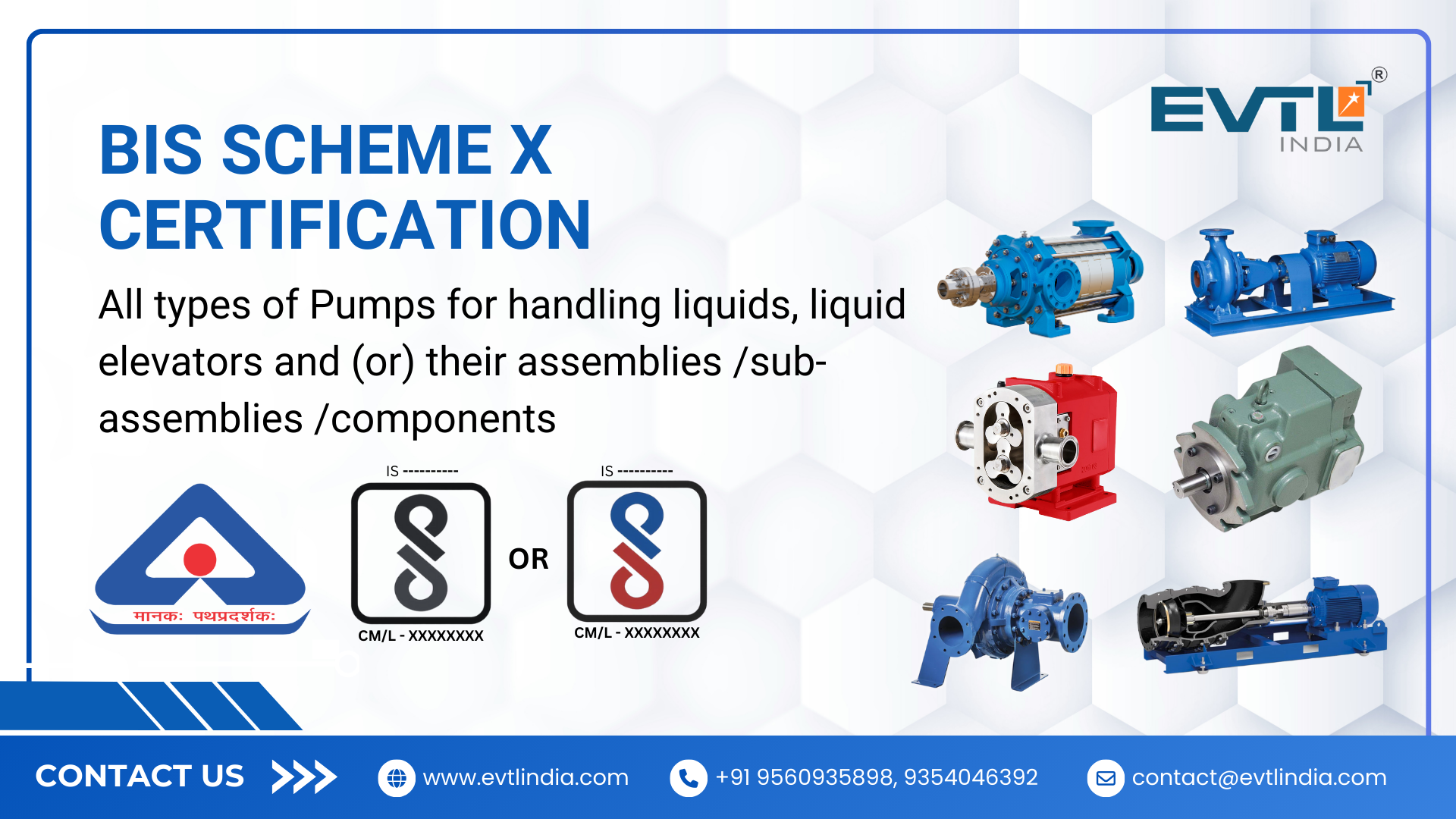
BIS Scheme X Certification for Pumps and Liquid Elevators

BIS Scheme X Certification for Compressors
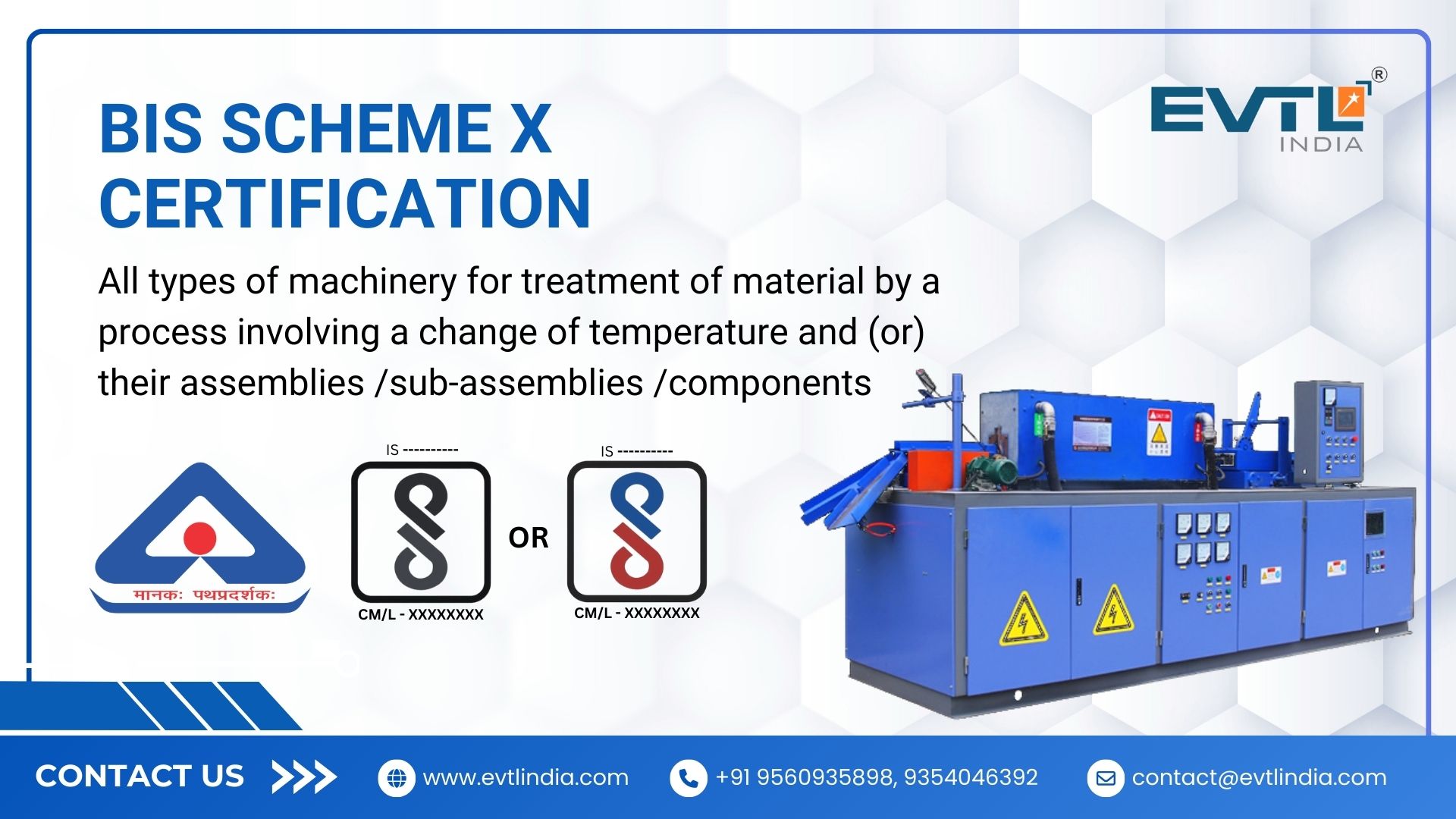
BIS Scheme X certification for Heat Treatment Equipment
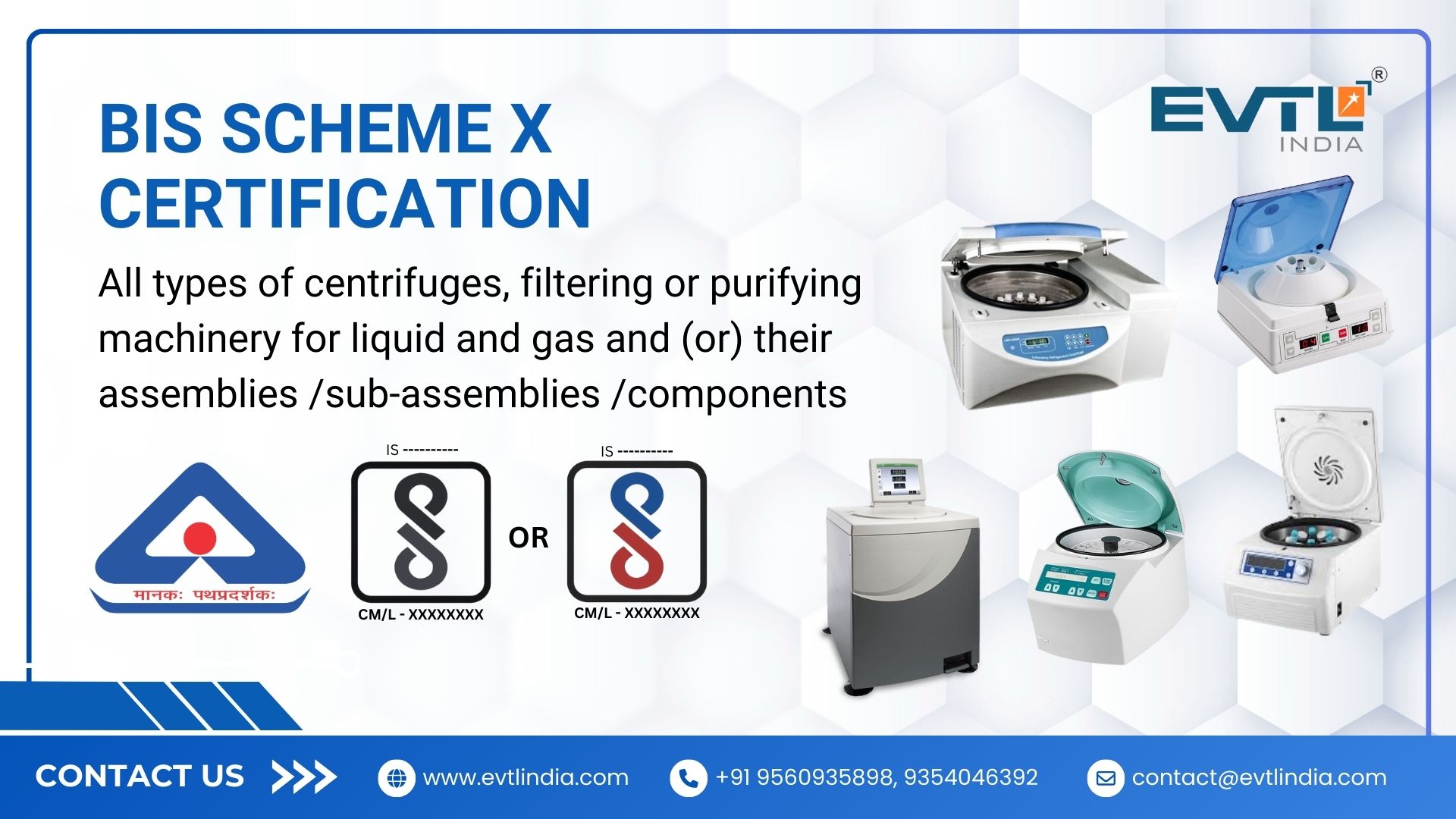
BIS Scheme X Certification for Centrifuges and Filtering or Purifying Machinery
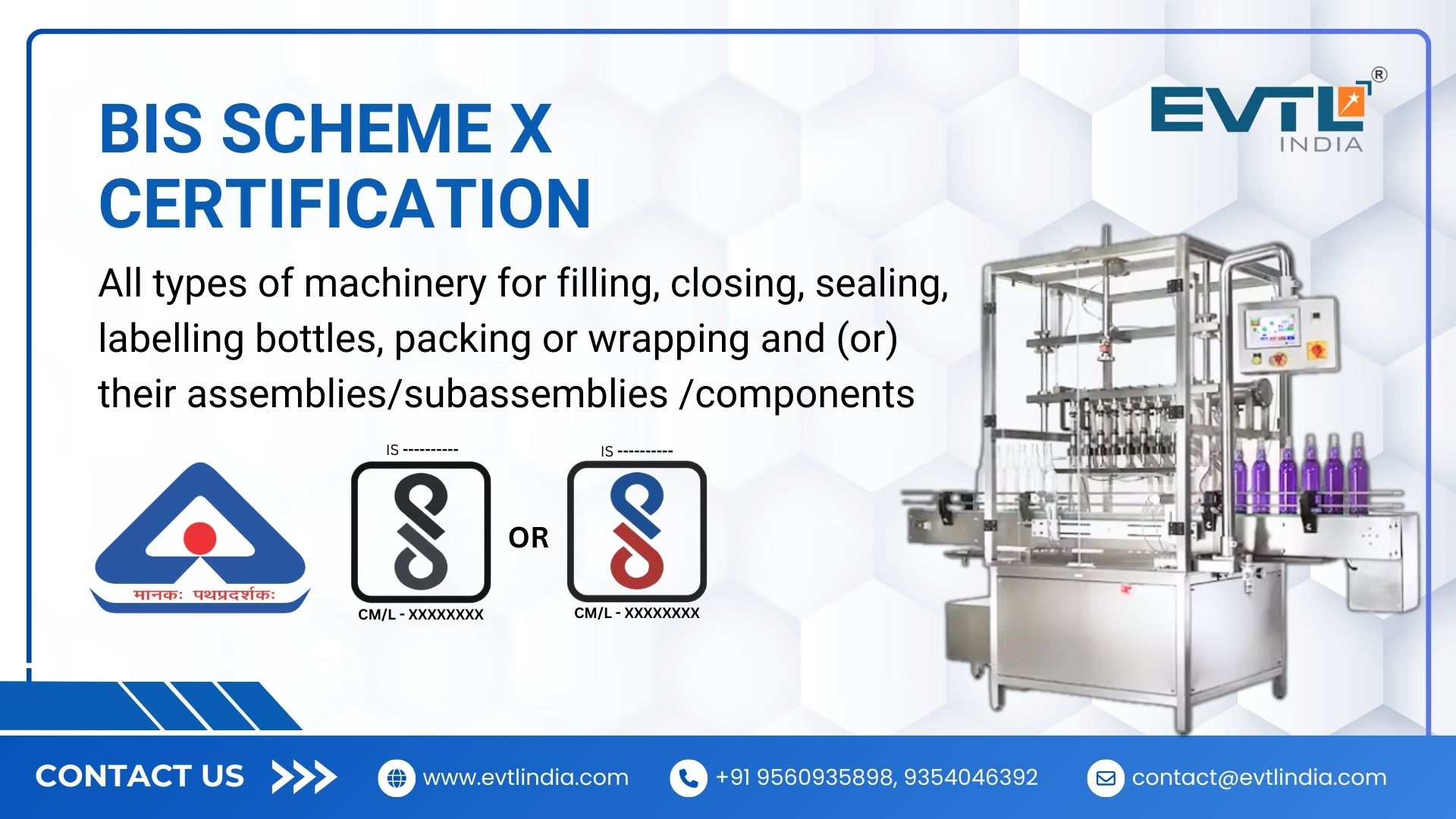
BIS Scheme X Certification for Machinery for Filling, Closing, Sealing, Labelling Bottles, Packing or Wrapping
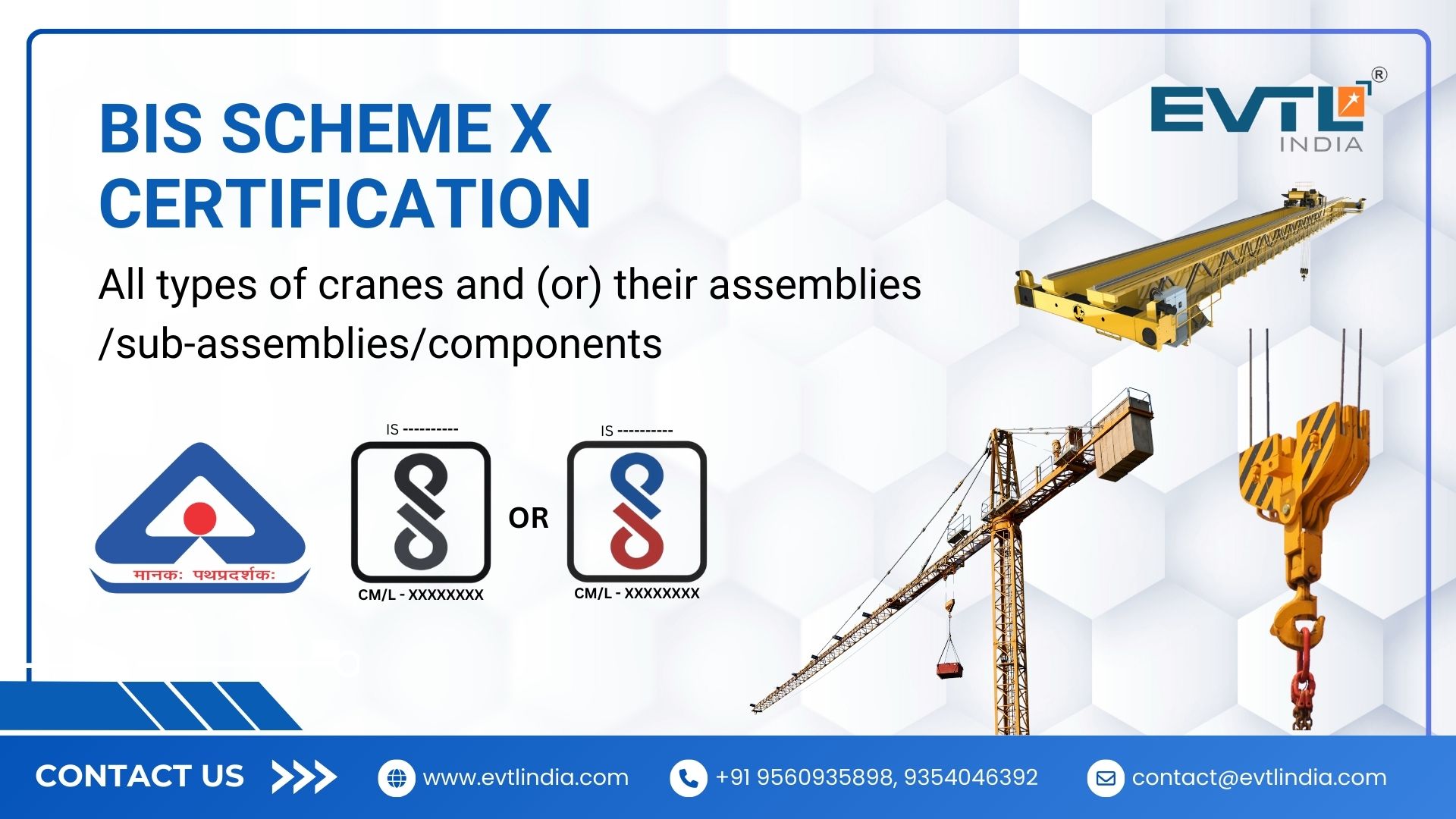
BIS Scheme X Certification for Cranes and Their Assemblies, Sub-Assemblies, or Components
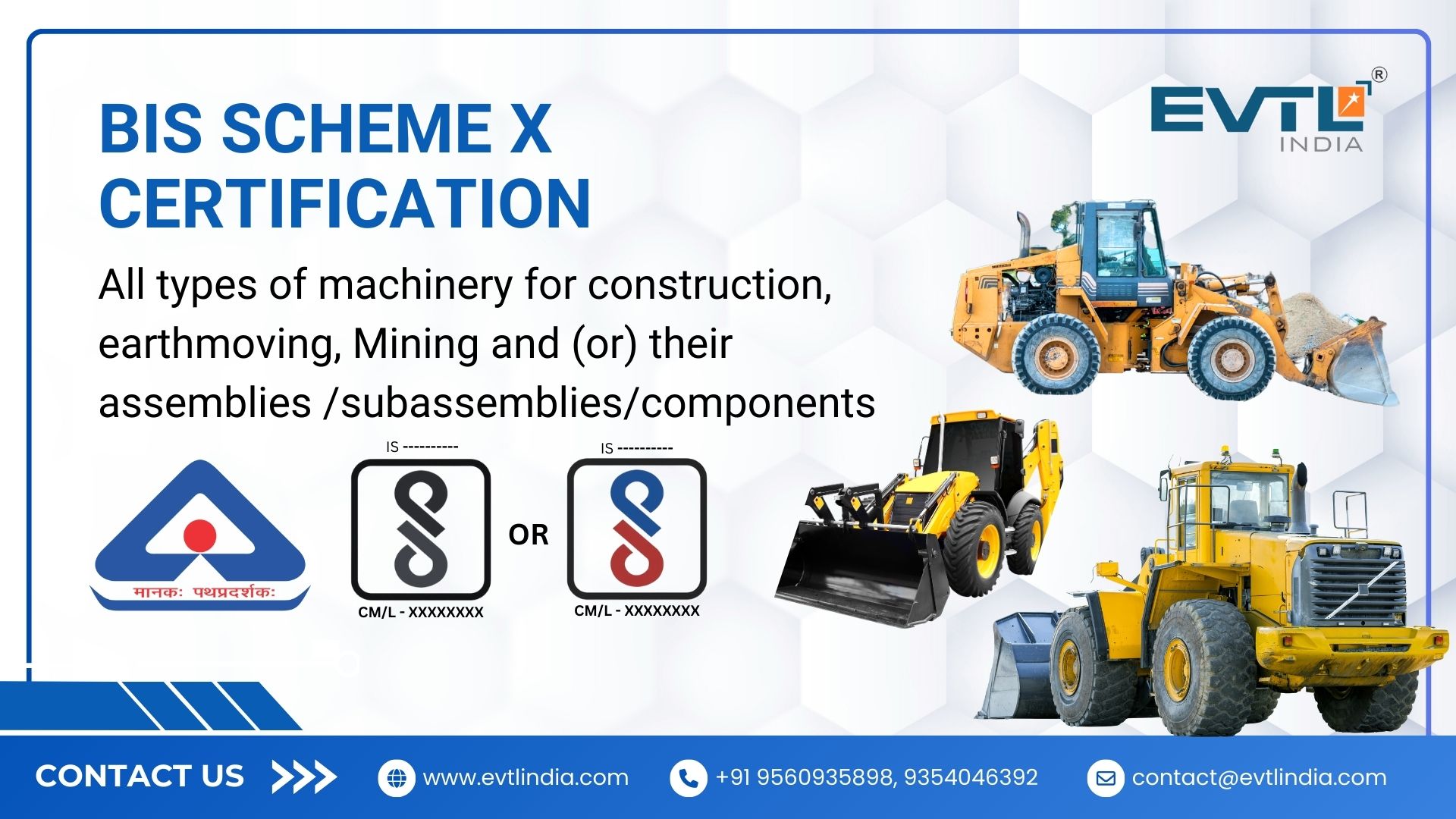
BIS Scheme X Certification for Construction, Earthmoving, and Mining Machinery
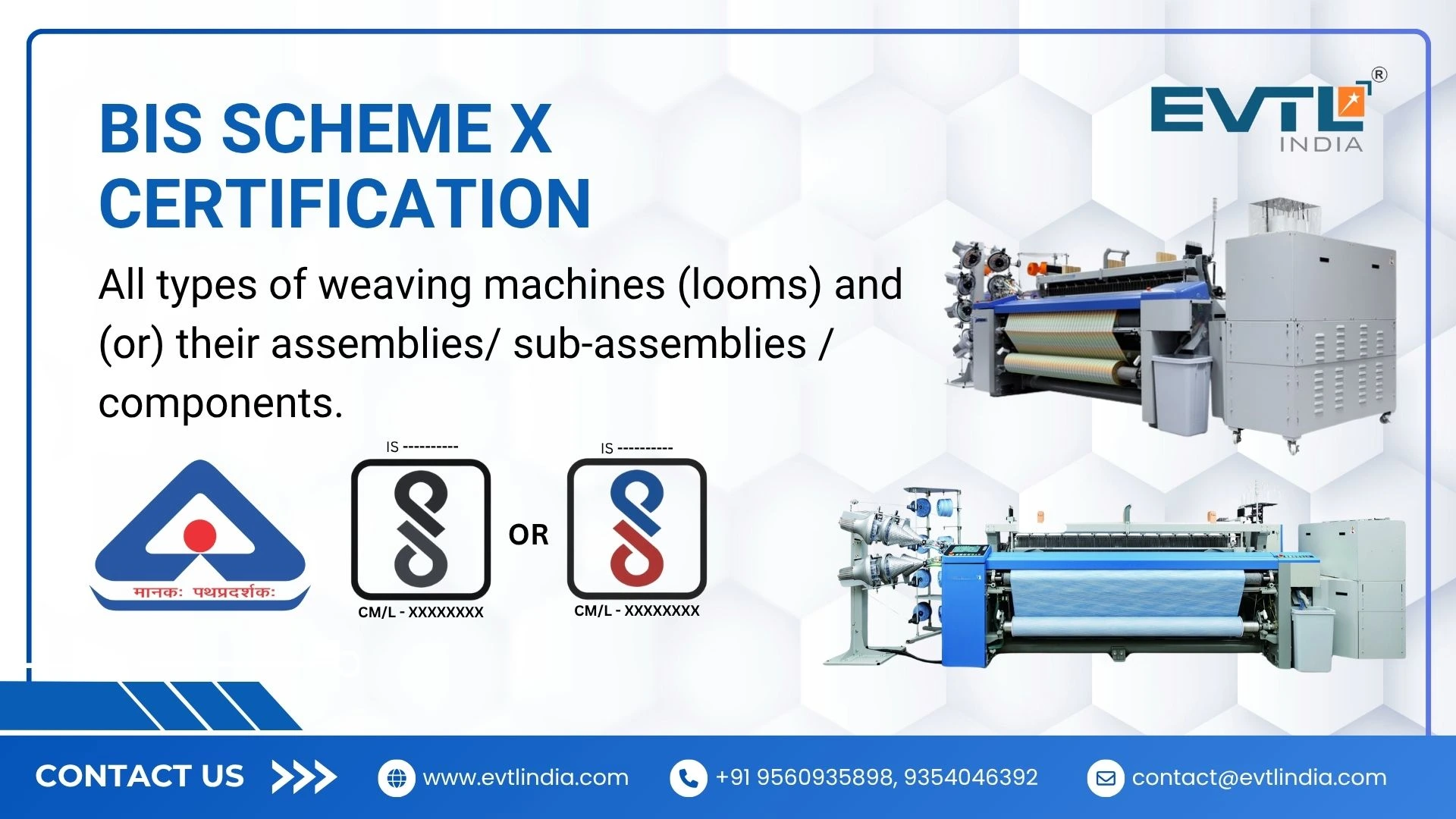
BIS Scheme X Certification for Weaving Machines (Looms)
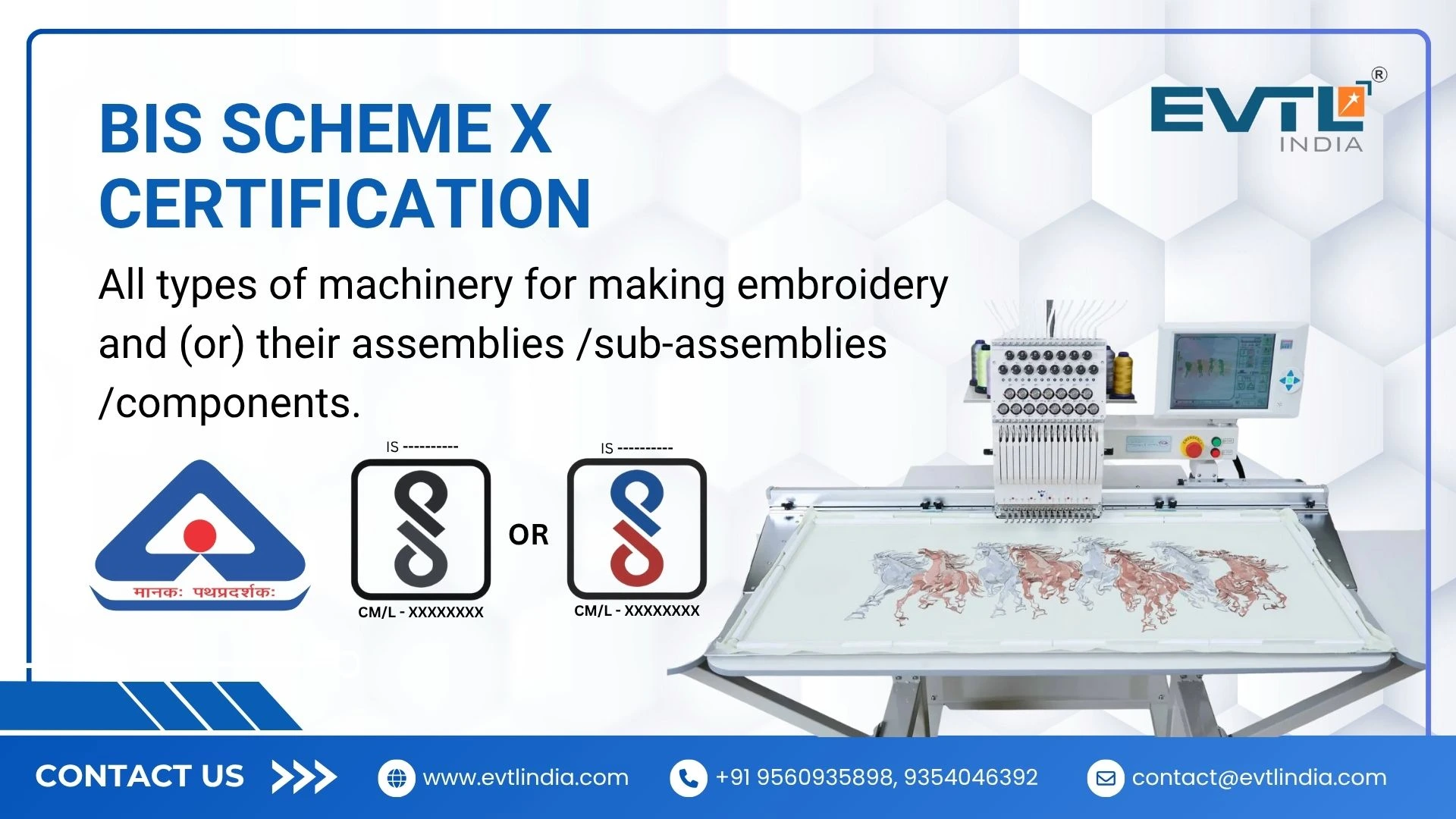
BIS Certification for Machinery for Making Embroidery
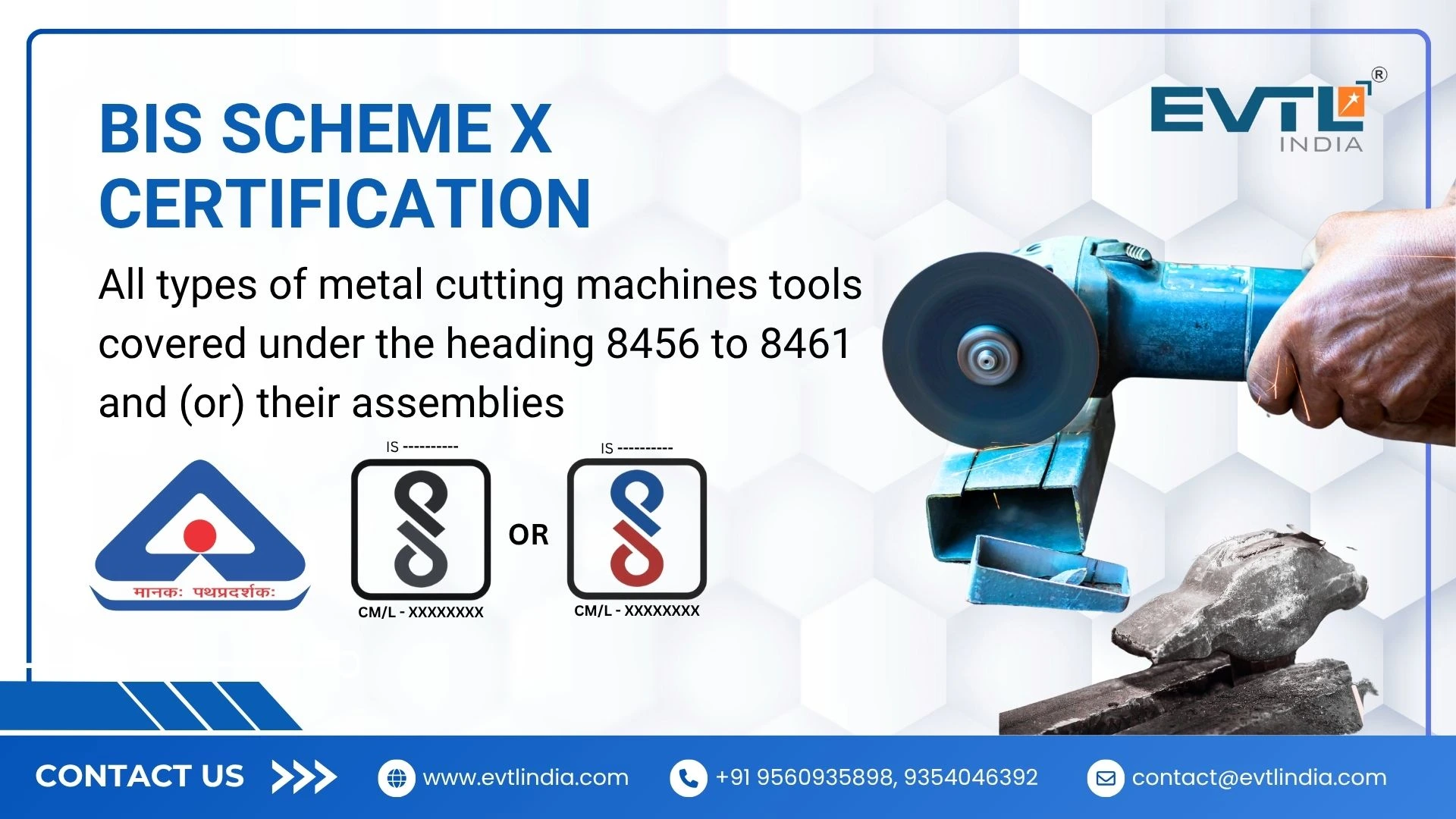
BIS Scheme X Certification for Metal Cutting Machine Tools (HS Codes 8456–8461)
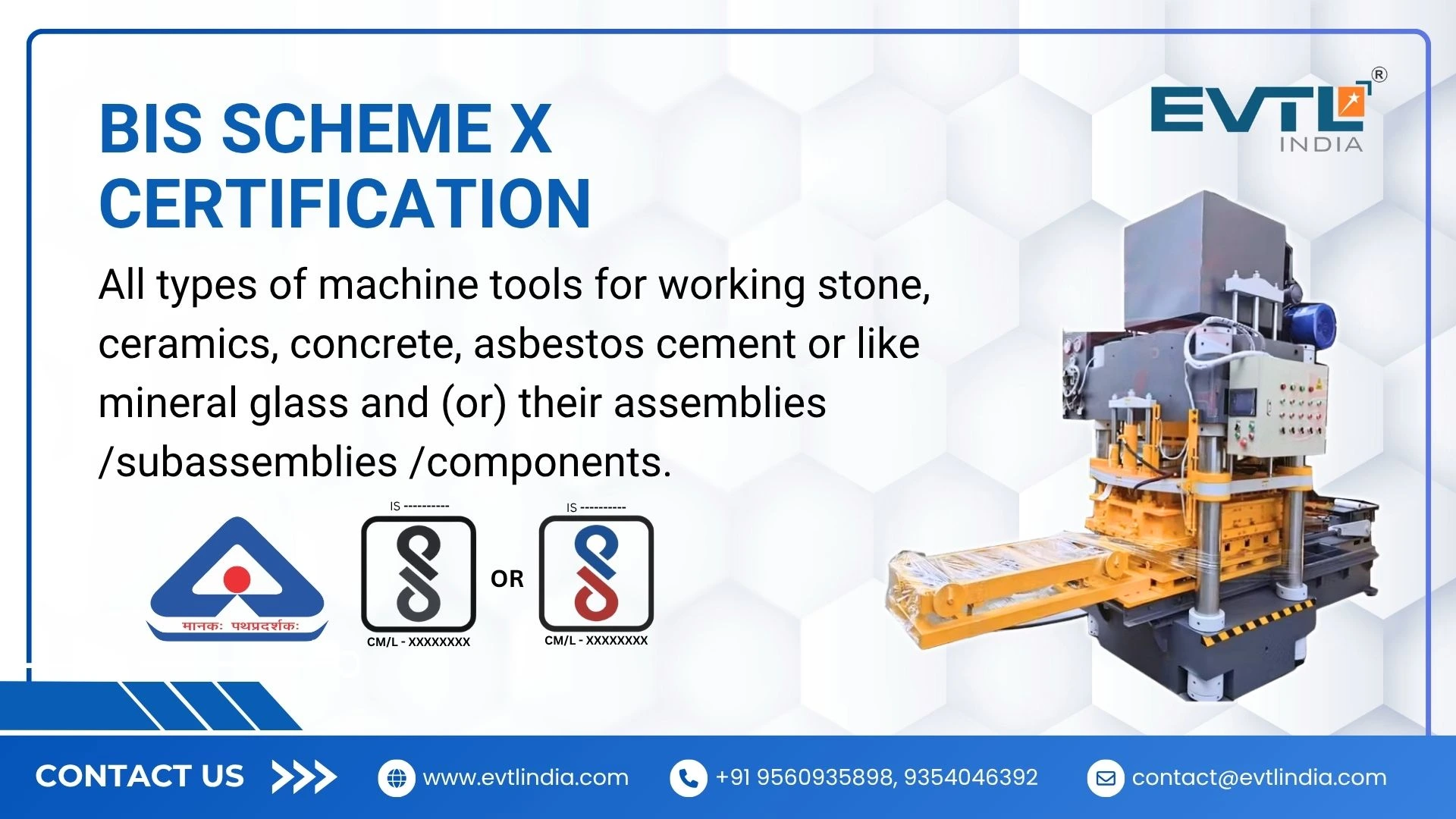
BIS Scheme X Certification for Machine Tools Working on Stone, Ceramics, Concrete, Asbestos Cement, and Similar Materials
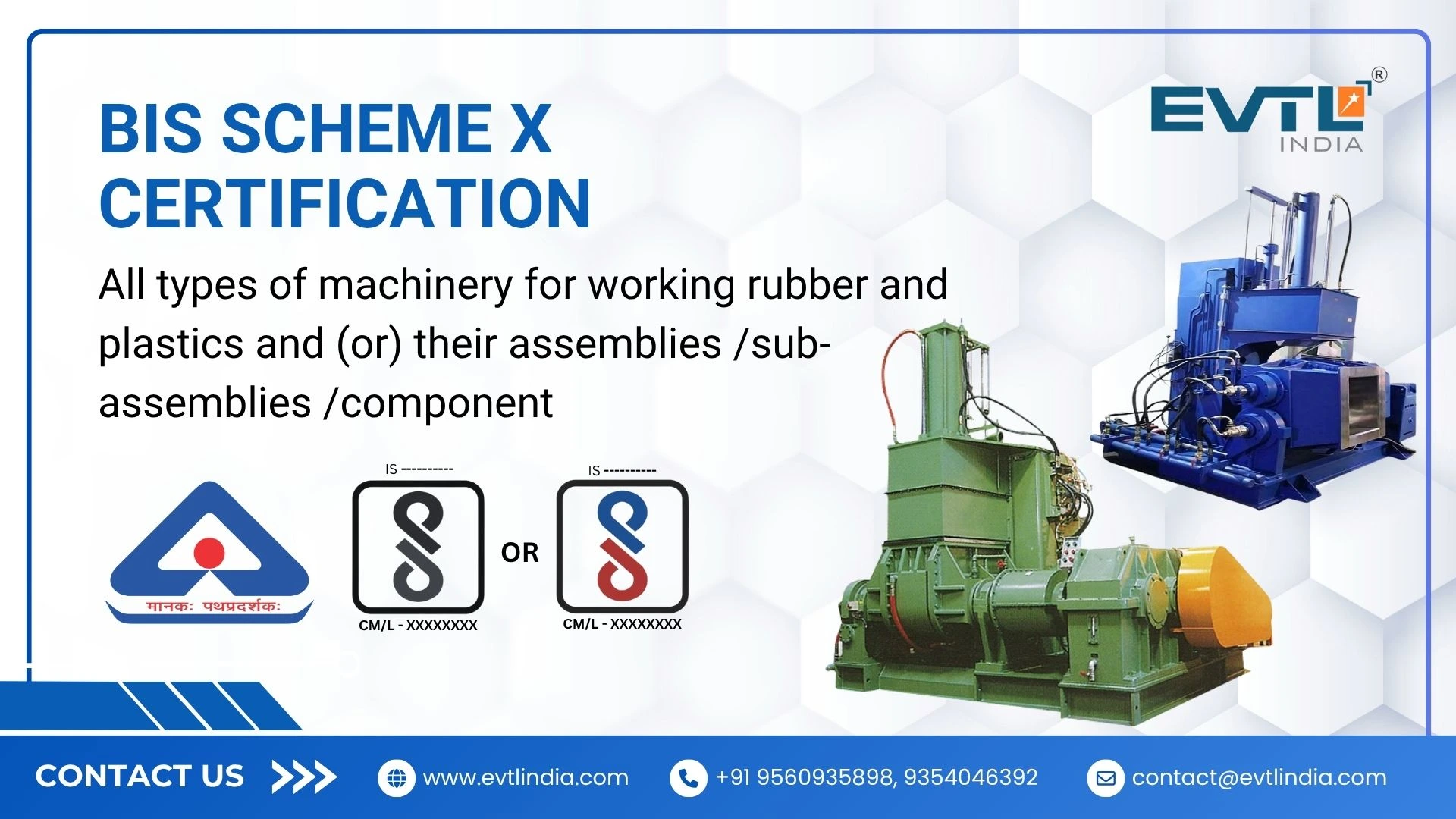
BIS Scheme X Certification for Machinery for Working Rubber and Plastics

BIS Scheme X Certification for Machines for Public Works, Building, and Other Mechanical Appliances
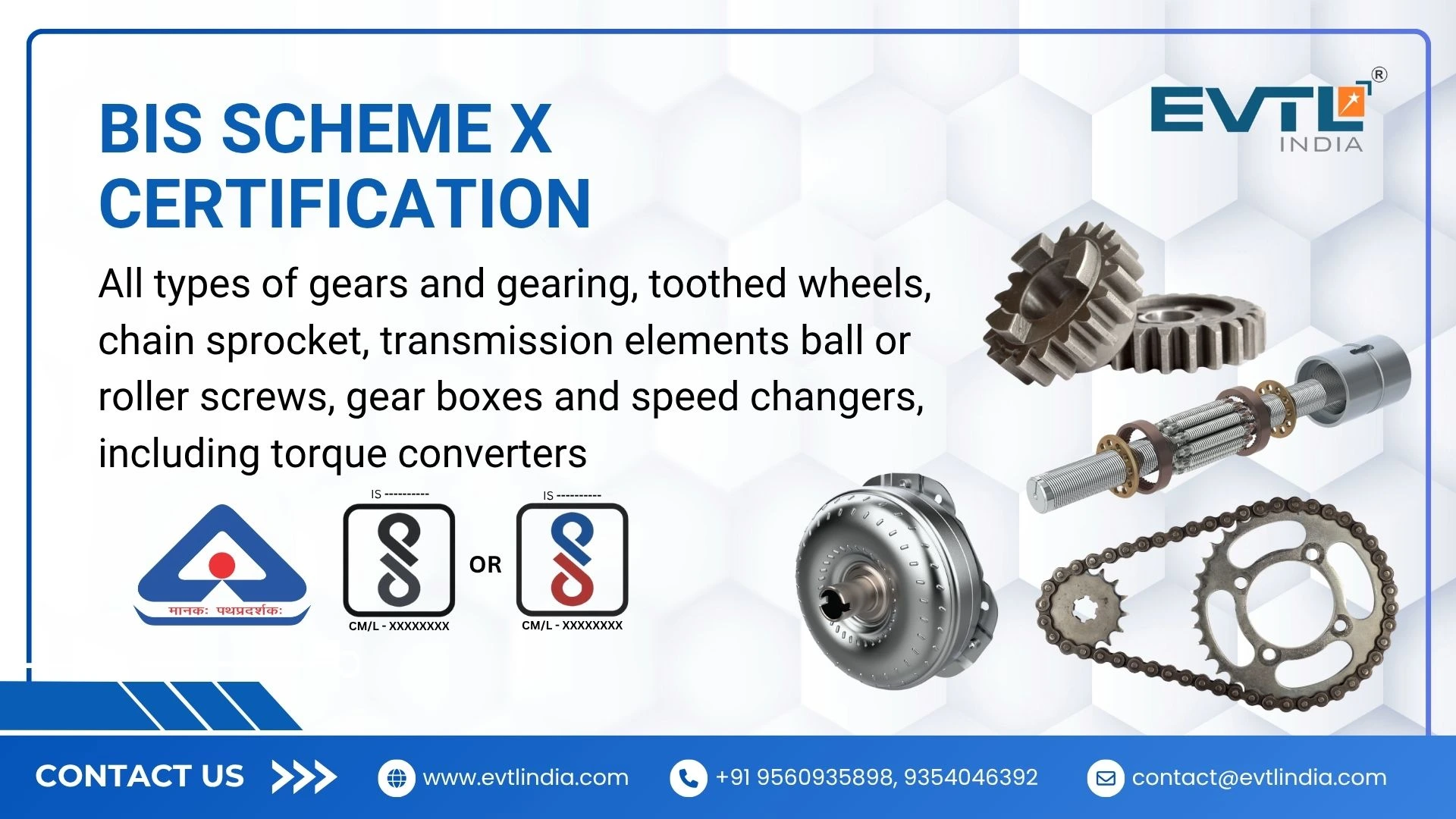
BIS Scheme X Certification for Gears, Gearing, and Transmission Elements
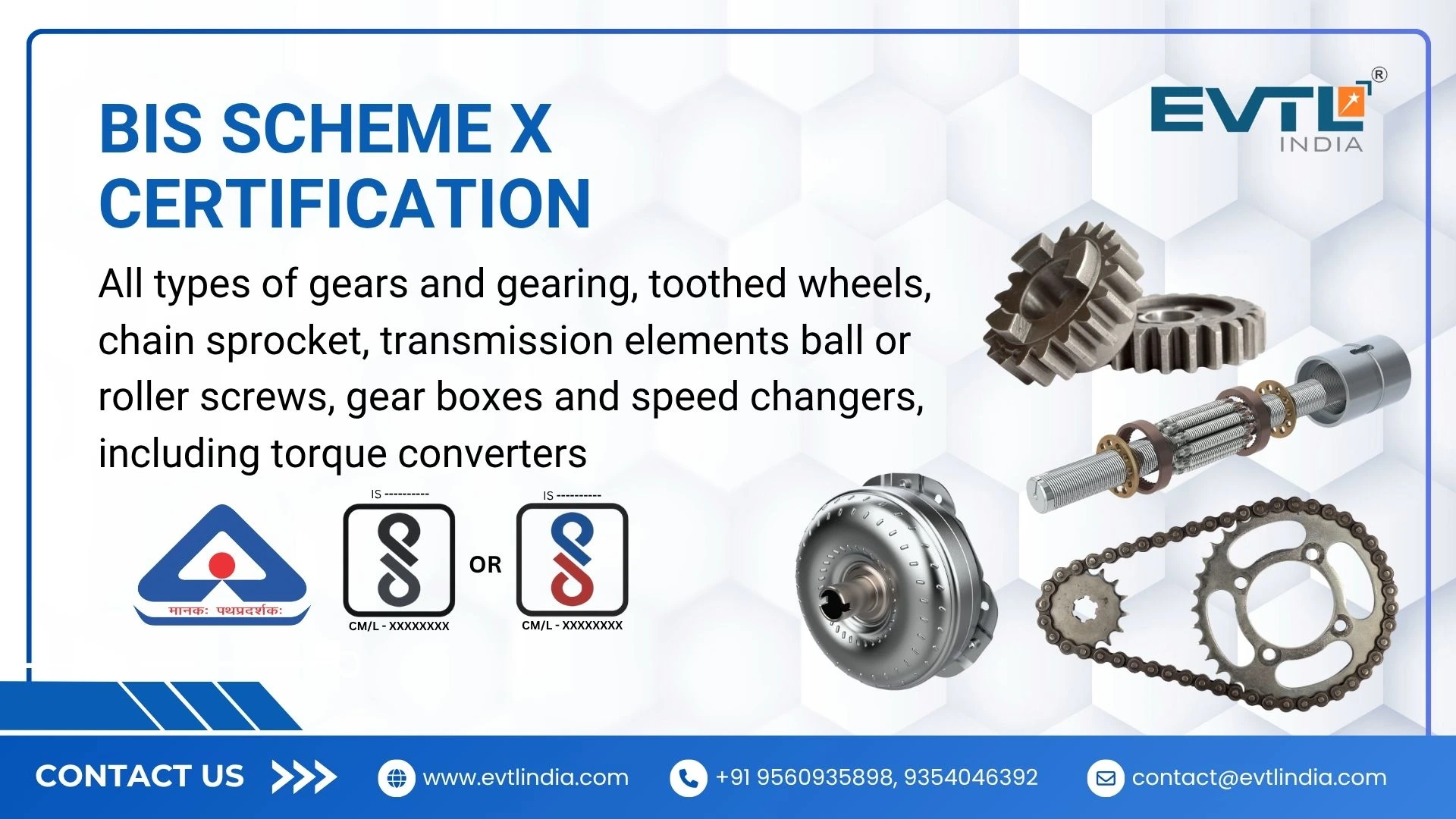
BIS Certification for Rotary Electrical Machines, such as Generators, etc
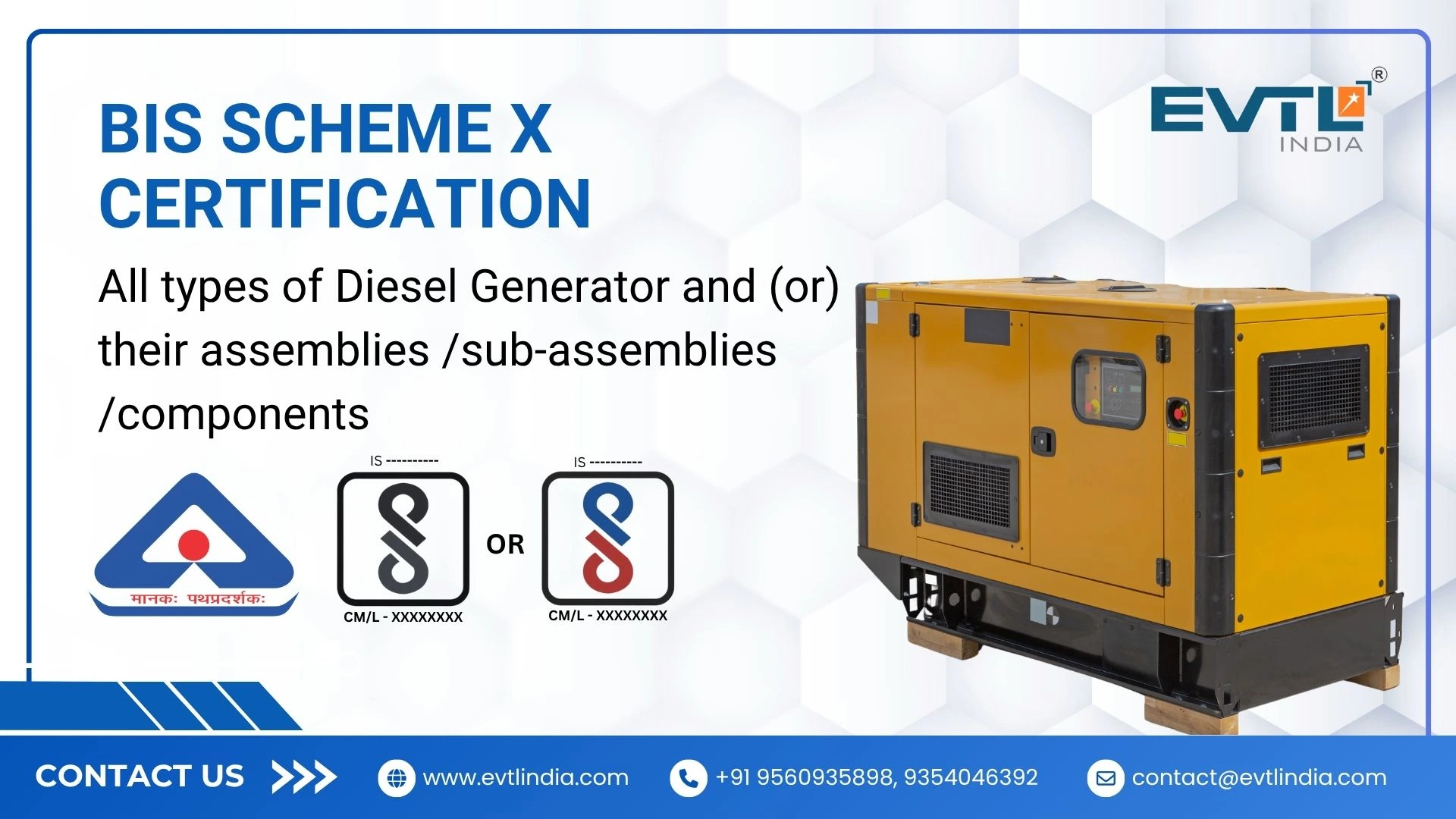
BIS Scheme X Certification for Diesel Generators and Their Components
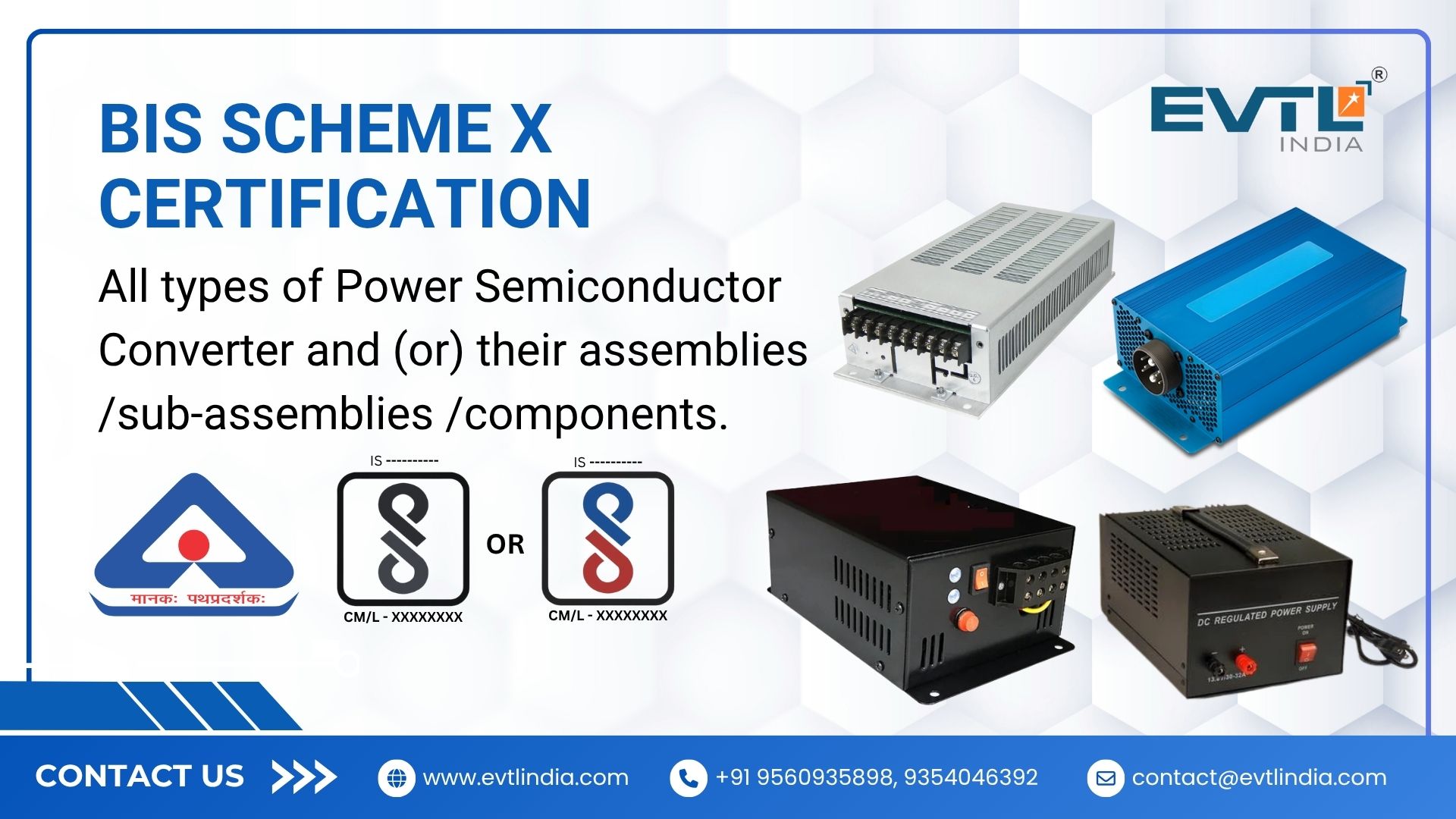
BIS Scheme X Certification for Power Semiconductor Converters
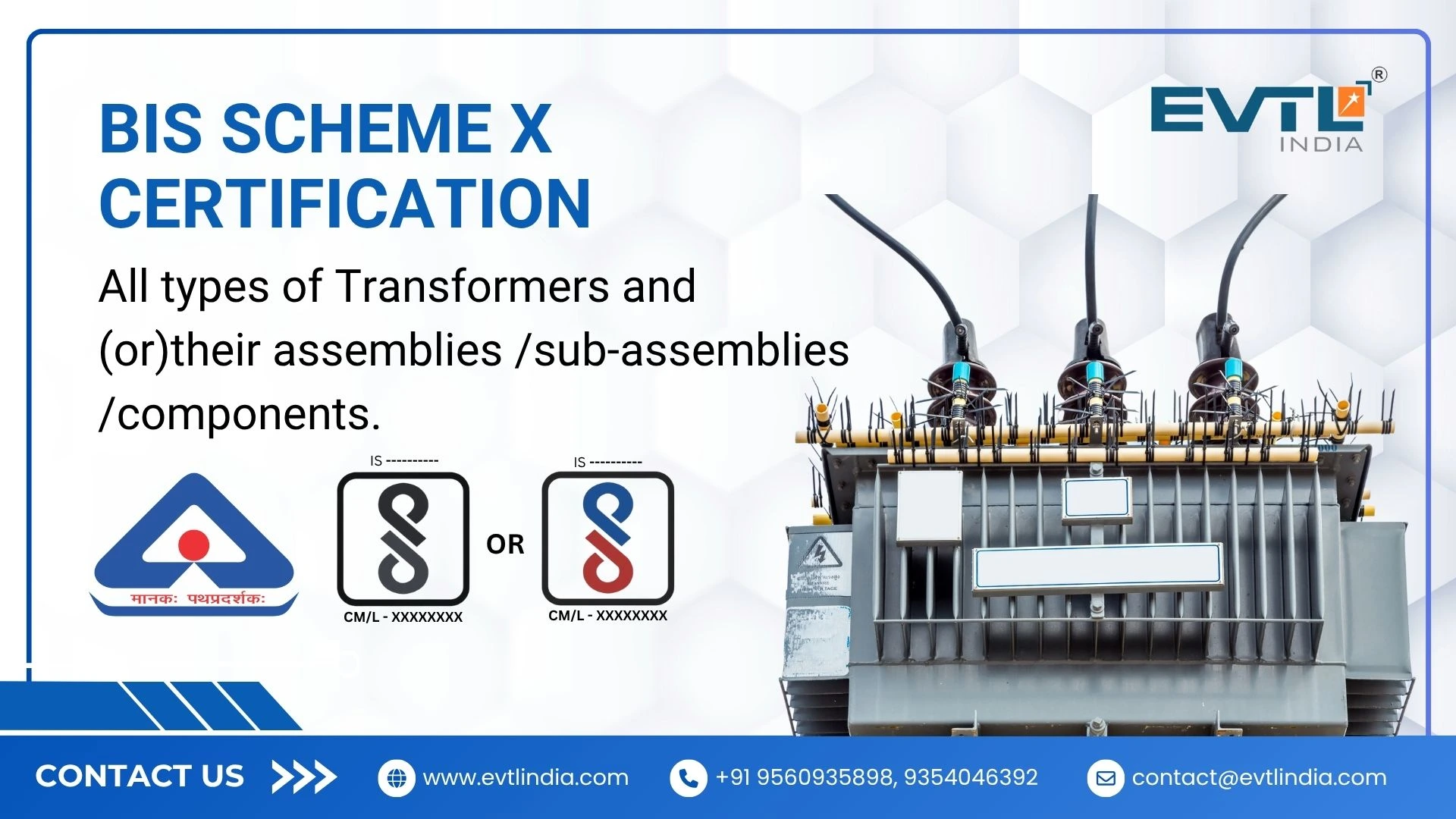
BIS Certification for Transformers and Their Components
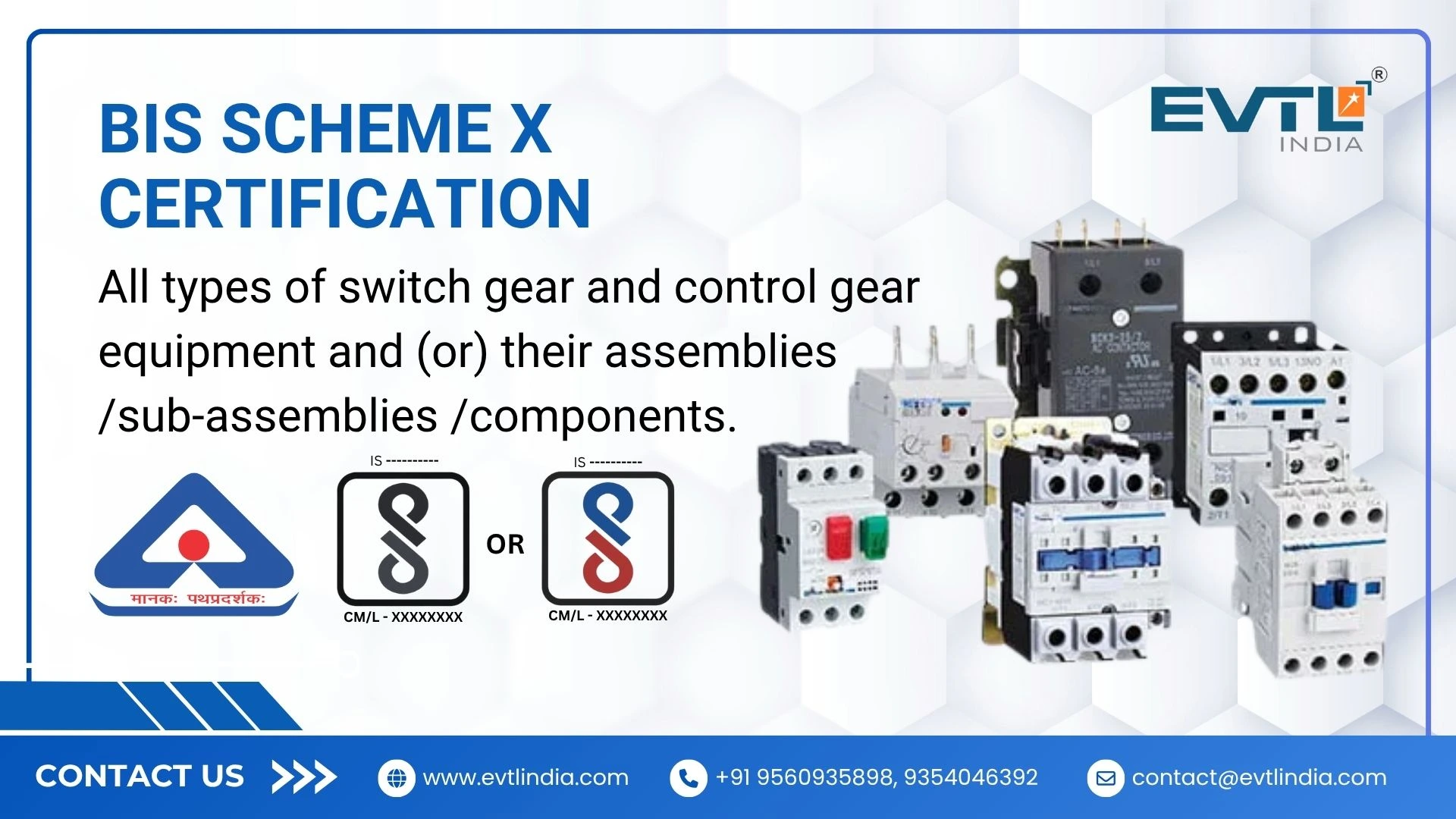
BIS Scheme X Certification for Switchgear and Controlgear Equipment (≤1000V)
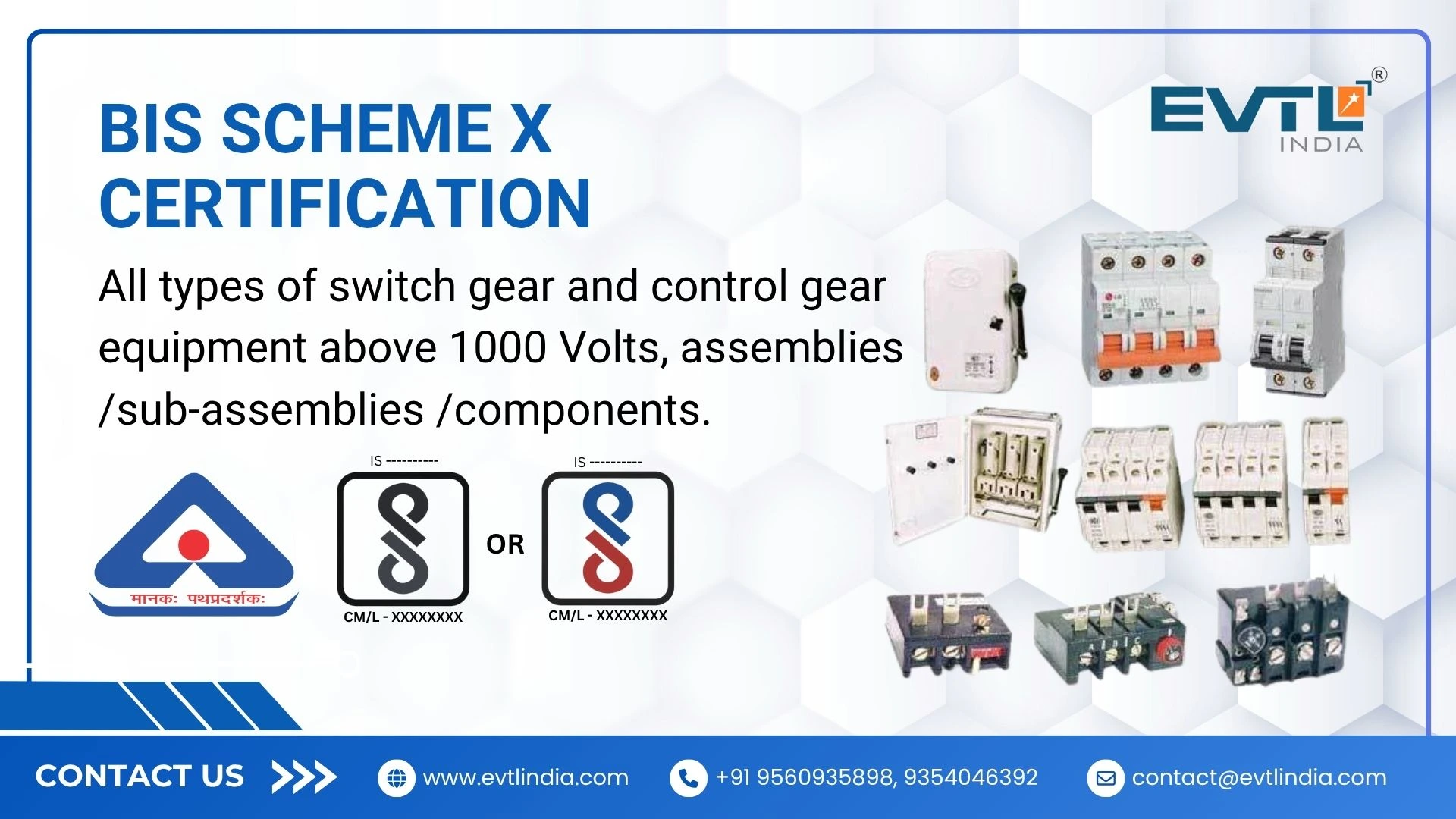
BIS Certification for Switchgear and Controlgear Equipment Operating Above 1000 Volts



